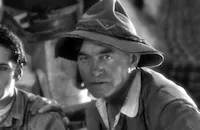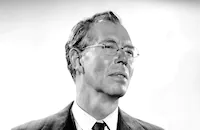Happy Land

Brief Synopsis
Cast & Crew
Irving Pichel
Don Ameche
Frances Dee
Harry Carey
Ann Rutherford
Cara Williams
Film Details
Technical Specs

Synopsis
One afternoon, in 1943, Lew Marsh, the third generation of Marsh men who have served as pharmacist to the small community of Hartfield, Iowa, is lunching with his devoted wife Agnes when a telegram arrives notifying them that their only child, Russell, whom they called Rusty, has been killed in action. Lew is overwhelmed by his grief, and as the weeks pass, he neglects the pharmacy and refuses to talk even to Agnes. Reverend Wood attempts to comfort Lew with the knowledge that Rusty died for his country, but Lew, bitter that Rusty never married or had a son of his own, declares that Rusty died for nothing because he had not lived a full life. After the reverend leaves, Lew is visited by the spirit of his late grandfather, Edward "Gramp" Marsh, who reared Lew after his parents died. Gramp tells Lew that he has been watching over him and is disturbed by his intense, prolonged mourning. At first Lew resists Gramp's offer to help, but Gramp insists on accompanying him on his afternoon walk. As they meander through the town, Gramp takes Lew back in time to review the events of his and Rusty's lives: Twenty-five years previously, Lew marches in a parade welcoming home the soldiers of World War I. After learning that his girl friend married another man during his absence, Lew meets Agnes Dickens. Lew and Agnes fall in love, and after they are married, Agnes gives birth to Rusty. Gramp dies shortly after Rusty's birth, but Lew takes comfort in his new family. As Rusty grows up, he becomes a mischevious boy who refuses to go to kindergarten without his dog, but also a kind-hearted little fellow who brings two half-starved classmates to the pharmacy for ice cream. When Rusty is twelve, Lew and Agnes watch with pride as he is inducted into the Boy Scouts. Lew's pride grows when, one day, he watches unseen as Rusty uses his own savings to pay for a prescription needed by a poor man for his pain-stricken wife. When Rusty is eighteen, he is a happy and hard-working teenager who falls in love for the first time with Gretchen Barry. Lew and Agnes are anxious about the relationship, and their fears about Gretchen are realized when she drops Rusty for an older boy. Lew tries to comfort his son by sharing a toast of loganberry wine, thereby acknowledging Rusty's manhood. Rusty is not alone for long, however, for he notices that Lenore Prentiss, a childhood playmate, has grown into a lovely young woman. Rusty and Lenore begin courting, and soon after, the youngsters are caught up in discussions about German aggression in Europe. Although some of Rusty's friends join the Canadian Flying Corps, Rusty decides to obtain his pharmacist's certificate so that he can be of more use if the war continues. Rusty does well in his classes, and despite their reluctance, Lew and Agnes realize that it is Rusty's right to make his own decision when he announces that he is joining the Navy. Rusty bids a fond farewell to Lenore and his parents, who do not know that it will be the last time they see their son. Gramp then brings Lew back to the present day and coaxes him to admit that Rusty did enjoy a full, rich life. Lew is still not sure that Rusty's sacrifice was worthwhile, however, so Gramp urges him to go to the pharmacy that evening. Lew does, and as he is closing up, a shy, young sailor named Anton Cavrek enters. He tells Lew that he is Tony, the soldier about whom Rusty often wrote in his letters home. Lew takes Tony to meet Agnes, and the Marshes listen as Tony describes how Rusty died while trying to save a wounded comrade. Agnes then bustles about preparing a room for Tony, who has no family of his own, while Lew pours him a glass of loganberry wine.

Director

Irving Pichel
Cast

Don Ameche

Frances Dee

Harry Carey

Ann Rutherford

Cara Williams
Richard Crane

Henry Morgan

Minor Watson

Dickie Moore
William Weber
Oscar O'shea
Adeline De Walt Reynolds
Roseanne Murray
James West
Larry Olsen
Bernard Thomas
Terry Masengale
Edwin Mills
James J. Smith

Mary Wickes

Walter Baldwin
Tom Stevenson
Aileen Pringle
Matt Moore
Darla Hood
Richard Abbott

Lillian Bronson
Ferris Taylor
Larry Thompson
Paul Weigel
Ned Dobson Jr.
Jackie Averill
Joe Bernard
Houseley Stevenson
Elvin Field

Juanita Quigley
Milton Kibbee
John Dilson
Leigh Whipper
Marjorie Cooley
Robert Dudley
Pass Lenoir
Crew
James Basevi
Harry Brand
Roger Heman
Joseph Hopkinson
Renè Hubert
Arthur Jacobson
Julien Josephson
Joseph La Shelle
Thomas Little
Kenneth Macgowan
Ray Mala
Cyril J. Mockridge
Emil Newman
Guy Pearce
Philip Phile
Fred J. Rode
Kathryn Scola
Fred Sersen
Dorothy Spencer
Russell Spencer
E. Clayton Ward

Film Details
Technical Specs

Articles
Happy Land
Made in 1943 at the height of World War II, Happy Land offered up something quite different than the usual patriotic propaganda churned out by Hollywood studios at the time. Instead of reveling in the glory of war, or the need to fight, it focuses its entire story on a father, Lew Marsh (Don Ameche), grieving and mourning for his only son, Rusty, who was killed in the war. When he receives the news, he doesn't take it lightly. He doesn't accept it and move on. He drops out of life, stops going into the pharmacy where he works, and stares silently out his backdoor window. Eventually, with the whole town worried, the local pastor stops by and gives him the usual pep talk: His son died for a great cause. His son was a hero. God has a plan. None of it works. The pastor leaves, defeated.
Later, as Marsh paces around his house, a voice calls to him in the backyard. It's the voice of his father and he stands stunned as his father, Gramp (Harry Carey), materializes out of thin air. He explains that he had to because he could see that his son wasn't coming around. While Lew doesn't pass it off as a bit of underdone potato, he does believe his eyes are fooling him and the appearance of his father merely signals the final breakdown of his mind as he struggles with grief. Gramp doesn't give up though and, eventually, Lew comes around to accept this ghostly visit as real and begins to stroll through time, just like Ebenezer Scrooge.
Happy Land works its way around to that pep talk the pastor gave by way of having Lew realize his son had a happy and fulfilling life, as short as it was. As Gramp takes him through both of their lives, he sees that his endless grief serves no purpose. When a fellow brother in arms of Rusty shows up at the end, played by Harry Morgan (billed as Henry Morgan), Lew accepts his son's death at last.
One can view Happy Land as a sincere, sentimental weeper or as one of the most cynical propaganda films ever released. Honestly, it works either way. It's not propaganda in the normal flag waving mode but more of a reminder to the folks back home that, yes, this war is going to take some time and we all have to deal with grief so just remember what we're fighting for. And to that degree, it works. As a purely sentimental journey, it works even better.
The film was directed by Irving Pichel, a director most known for his adventure work, The Most Dangerous Game (1932), and his sci-fi classic, Destination Moon (1950). Pichel was blacklisted after he was one of the nineteen writers and directors called to testify before HUAC in 1947 but was later cleared. Nonetheless, he was forced out of Hollywood and died at the age of 63 before the blacklist ended.
Don Ameche, the star of the production, was a familiar face to moviegoers at the time but not for serious, deeply affected roles. His turn here was quite different for him and surely signaled a desire on his part to try for more dramatic roles. While very good, Hollywood kept Ameche in lighter fare throughout his career. Years later, after making a minor comeback in the Eddie Murphy comedy Trading Places (1983), he won his first and only Oscar, for Best Supporting Actor, for Cocoon (1985).
Also appearing in the film were Frances Dee, Ann Rutherford, and Richard Crane, all doing solid work. Two child actors of note also appeared. One was Dickie Moore, now a teenager, and the other was Natalie Wood, though she wasn't billed. She was five and it was a tiny role but greatness would come her way soon enough.
Happy Land was filmed on location, something not done much at the time. Rather than build a Main Street at the studio, they used the real Main Street of Healdsburg, California and did some more location shooting in Santa Rosa. Sentimental crowd pleaser or propaganda plea to prepare for grief, the film works either way and stands as one of the better war films released during the war itself.
Director: Irving Pichel
Producer: Kenneth Macgowan
Writers: Kathryn Scola, Julien Josephson; based on the novel by MacKinlay Kantor
Music: Cyril J. Mockridge
Director of Photography: Joseph LaShelle
Editor: Dorothy Spencer
Art Direction: James Basevi, Russell Spencer
Cast: Don Ameche (Lew Marsh), Frances Dee (Agnes Marsh), Harry Carey (Gramp), Ann Rutherford (Lenore Prentiss), Cara Williams (Gretchen Barry), Richard Crane (Russell 'Rusty' Marsh), Henry Morgan (Anton 'Tony' Cavrek), Minor Watson (Judge Colvin), Dickie Moore (Peter Orcutt)
By Greg Ferrara

Happy Land
Quotes
Trivia
Notes
Screenwriter Julien Josephson's first name was spelled "Julian" in the opening credits. An abridged version of MacKinlay Kantor's novel appeared in the The Saturday Evening Post on November 28, 1942 and in the August 1943 issue of Reader's Digest. According to Hollywood Reporter news items, Twentieth Century-Fox originally intended to use Kantor's novel, which was purchased for $25,000, as a vehicle for Thomas Mitchell. Subsequent news items reported that Joseph Cotten and Robert Young were also considered for the film. According to Hollywood Reporter news items and studio publicity, the picture was shot on location in Santa Rosa, CA, with additional scenes being filmed in nearby Healdsburg. The Time review adds that some scenes were shot in Sebastopol. A Hollywood Reporter news item stated that the picture would have its premiere in sixty-one theaters in Iowa on December 2, 1943. The picture marked the screen debuts of stage actress Lillian Bronson and Cara Williams. According to studio publicity, Alfred Hitchcock's daughter Patricia was also to make her debut, although her participation in the finished film has not been confirmed. According to modern sources, five-year-old Natalie Wood, who was a resident of Santa Rosa, appears in a bit part in the picture. Don Ameche starred in a Lux Radio Theatre broadcast of the story on April 10, 1944. A television adaptation of the film was presented on the 20th Century-Fox Hour in February 1956, under the title In Times Like These.
















